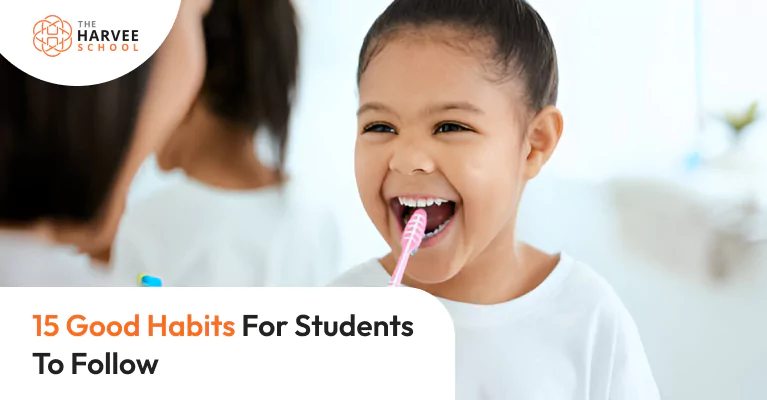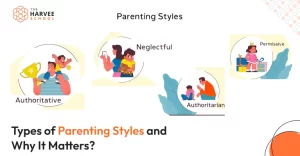15 Good Habits For Students To Follow
Habits are like building blocks—they shape how we learn, grow, and approach challenges. It can be easy to develop them at an early age and for children, adopting the right habits can make their learning journey smoother, more enjoyable, and even more rewarding in the long run. Let’s see 15 key habits that every kid can develop to help them succeed both in and out of school.
Being On Time
One of the most important habits kids should learn early is punctuality. Being on time to school and activities shows respect for others and helps start the day on the right foot. It also ensures that they don’t miss important lessons, assignments, or instructions.
Listening Carefully in Class
Learning to listen attentively is a skill that helps children understand lessons better and retain information. When they focus on what the teacher is saying, they are more likely to grasp the material and participate in class discussions. Encouraging active listening from a young age helps improve communication and learning.
Being Organized
Keeping school materials like books, notebooks, and pencils organized is a habit that can make a big difference. Children should learn to keep their backpacks, desks, and study spaces neat so that they can find what they need easily. Organization helps them stay prepared and reduces stress during homework time or when preparing for tests.
Asking Questions
Kids should feel comfortable asking questions when they don’t understand something. Curiosity is a great trait, and asking questions helps clarify doubts and improve understanding. Whether in the classroom or at home, encouraging children to speak up will make them more confident and engaged learners.
Completing Homework on Time
Learning to complete homework on time is essential for academic success. This habit teaches kids about responsibility and time management. Setting aside a specific time each day to do homework helps kids avoid procrastination and ensures that they don’t fall behind in their studies.
Reading Every Day
Reading is one of the most powerful habits for learning. It helps expand vocabulary, improve comprehension, and spark creativity. Kids should be encouraged to read something every day, whether it’s a book, magazine, or even an online article. Building a daily reading habit makes learning fun and supports academic growth.
Playing Outdoors and Exercising
Physical activity is just as important as studying. Kids should make it a habit to play outside, ride bikes, or participate in sports. Regular exercise keeps them healthy, improves their mood, and helps them focus better when it’s time to study.
Helping at Home
Chores teach kids about responsibility and teamwork. Helping with simple tasks around the house, such as tidying their room, helping set the table, or taking out the trash, helps kids understand the importance of contributing to their family. This habit also promotes a sense of independence and accountability.
Being Kind to Others
Kindness is a habit that benefits everyone. Teaching kids to be kind to their classmates, teachers, and family members helps them build strong relationships and a positive attitude. Acts of kindness, like sharing, helping a friend, or using polite language, create a caring environment at school and home.
Eating Healthy Foods
A healthy diet plays a major role in a child’s energy levels, focus, and overall well-being. Pack your kids’ lunch boxes with healthy fruits, vegetables, and whole grains, and monitor their hydration levels regularly. Limiting sugary snacks and junk food helps them stay more alert and attentive during school hours.
Getting Enough Sleep
Sleep is crucial for a child’s development and ability to concentrate in school. Children require between 9 and 12 hours of sleep each night, depending on their age. Having a consistent bedtime routine helps them wake up refreshed and ready to learn.
Taking Breaks
While studying is important, kids also need breaks to recharge. Taking short breaks during study time or between activities helps children stay focused and prevents burnout. It’s a good habit for improving concentration and keeping the mind sharp.
Using Technology Wisely
In today’s world, kids are exposed to technology from a young age. It’s important for them to learn how to use technology responsibly. Setting time limits on screen time and choosing educational content over mindless entertainment helps kids balance fun with learning.
Practicing Gratitude
Gratitude is a habit that develops happiness and positivity. Encouraging kids to reflect on things they are thankful for, like their family, friends, or even a fun day at school, helps them develop a positive outlook on life. Practicing gratitude can improve their emotional well-being and boost their self-esteem.
Believing in Themselves
Self-confidence is key to overcoming challenges. Encourage kids to believe in their abilities and to approach tasks with a positive attitude. Whether they’re learning a new skill or working through a tough math problem, the belief that they can succeed is a habit that will take them far in life.
Conclusion
Forming good habits early in life sets the stage for future success. For kids, these 15 habits will not only improve their academic performance but also help them become more responsible, kind, and confident individuals. From being organized and completing homework on time to practicing kindness and gratitude, these habits foster both intellectual and emotional growth.
By encouraging children to develop these habits at a young age, parents and teachers can help shape well-rounded individuals who are prepared to succeed in school and beyond. It’s never too early to start building good habits, and the sooner they begin, the more these behaviors will become second nature, guiding them throughout their lives.






